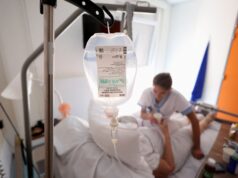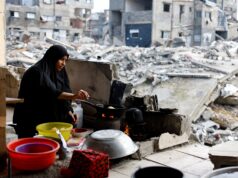
WARSAW, Poland — Several Russian drones entered Polish airspace in the morning hours of Sept. 10, and were shot down by Polish military, with debris falling in eastern and central Poland.
It was also a night of horror in Ukraine, where amid a furious drone attack on the whole country, dozens of civilians were killed.
The primate of Poland, Archbishop Wojciech Polak of Gniezno, reacted to the news by stating firmly that if until now there were “any doubts” about the need to address the topic of peace and seek paths to peace, they are now “dispelled.”
“These provocations affect not only Ukraine or the Holy Land, but also us,” he said, adding that “we’re all the more obliged to call for peace and search together the paths of peace.”
The incident marks the most serious cross-border incident into a NATO member country since the war in Ukraine began, The Associated Press reported. Civil defense alerts were issued to residents in seven provinces.
During a press conference held Sept. 10 ahead of the 12th Congress of Gniezno, an international conference organized in the context of global peace under the theme “Courage for Peace,” Archbishop Polak stressed that peace is not merely the absence of war, but a reality built through human action across multiple areas of life.
Polish authorities immediately reacted to the threat. During an emergency session of the Sejm — the Polish higher chamber of parliament — Prime Minister Donald Tusk called the drone incursions “a large-scale provocation” and assured Poles that the threat had been neutralized.
“The procedures worked, the decision-making process was flawless, and the threat was eliminated thanks to the decisive action of our commanders, soldiers, pilots and allies” he said earlier during a special government emergency meeting, emphasizing Poland’s readiness and the importance of NATO solidarity in the face of Russian aggression.
Polish President Karol Nawrocki described the overnight drone attack as “an unprecedented moment in the history of NATO, but also the contemporary history of Poland.” He emphasized that the incident requires “full consequences” to be drawn and a thorough assessment within the framework of the North Atlantic Alliance.

Poland has formally invoked Article 4 of the North Atlantic Treaty, triggering consultations among NATO allies on the alliance’s response and security measures — without committing the alliance to military action.
NATO Secretary General Mark Rutte reaffirmed solidarity with Poland, denouncing Russia’s “reckless behavior,” and noting that Article 4 allows for consultations rather than automatic military action.
Rutte confirmed he was in direct contact with Warsaw as the crisis unfolded. Allied aircraft, including Dutch F-35s, assisted Poland in securing its airspace.
Polish pilots — backed by the alliance’s Dutch fighter jets, Italian surveillance aircraft and German Patriot air defense systems — shot down the 19 Russian drones. No one was injured in the incident, but one family house in the village of Wyryki was damaged, with its roof completely devastated by the falling debris.
“My message is clear: Stop the war in Ukraine … stop violating allied airspace, and know that we stand ready, that we are vigilant and that we will defend every inch of NATO territory,” Rutte told reporters during the briefing in Brussels, several media outlets reported.
European Commission President Ursula von der Leyen expressed strong condemnation of the attack, describing the incident as “reckless and unprecedented,” emphasizing the European Union’s unwavering support for Poland.

When asked about the drone incursions into Polish airspace, the Kremlin declined to comment, stating that it is a matter for Russia’s defense ministry. Kremlin spokesperson Dmitry Peskov dismissed the EU and NATO accusations as baseless, saying: “The leadership of the EU and NATO accuse Russia of provocations on a daily basis. Most of the time, without even trying to present at least some kind of argument.”
The drone attacks on Poland come amid a much larger overnight Russian assault on multiple regions across Ukraine.
Ukrainian President Volodymyr Zelensky reported that Russia launched 415 drones and 40 missiles in overnight attacks, targeting 15 regions across Ukraine.
The Ukrainian Air Force intercepted 386 drones and 27 missiles, but 16 missiles and 21 drones struck 17 locations, damaging civilian infrastructure, including industrial sites in Vinnytsia and triggering a large fire in Volyn.
At least 24 civilians were killed and dozens were injured in the attacks — including elderly people lined up to receive their pensions. Following the strikes, Ukrainian Foreign Minister Andrii Sybiha called on neighboring countries to deploy air defenses over Ukraine, stating on X: “Ukraine has suggested such a step for a long time. It needs to be taken for the sake of collective security.”
Before the overnight attack, Major Archbishop Sviatoslav Shevchuk told Apostrophe media in a Sept. 9 interview that true peace and victory are not merely human achievements.
“When I pray to God for victory, I say: God, grant us such a victory that everyone will see it comes from You,” said Major Archbishop Shevchuk.
He stressed that the source of wars is people themselves, who initiate them and then become their hostages. “People fall into slavery to this diabolical whirlwind of war. But peace comes from God.”
Major Archbishop Shevchuk echoed Pope Leo XIV who pleaded in his final remarks after the Sts. Carlo Acutis and Pier Giorgio Frassati canonizations: “God does not want war. God wants peace!”











